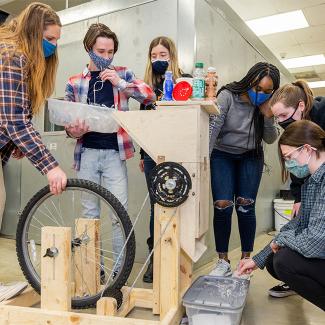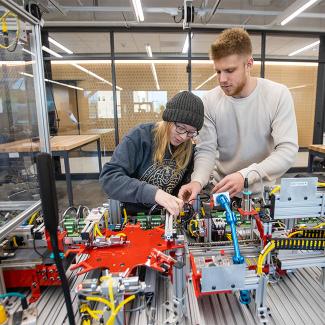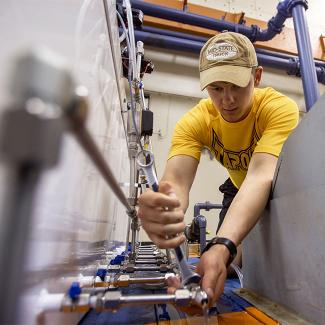Earn Your Degree At A Leading Mechanical and Industrial Engineering School in Wisconsin
Whether you are a mechanical engineer who designs, builds, and tests everything from a micro-scale sensor to spacecraft, or an industrial engineer who sees the big picture and works to make processes faster and more efficient—you are bringing innovative solutions to some of the biggest global challenges.
Mechanical Engineering
Our mechanical engineering department places emphasis on the practical aspects of theory while demonstrating a commitment to building students’ teamwork and communication skills. The modern labs feature digital data acquisition and processing, providing you with valuable hands-on experience, and the excellent student-to-faculty ratio assures dedicated, quality interaction with the program’s faculty and advisors.
At UW-Platteville, mechanical engineering graduates find that their versatility, structured problem-solving skills, imagination, and persistence make them among the most sought-after employees in industries that include aerospace, automation, automotive, computer, and construction, as well as the medical field. Additionally, a degree in mechanical engineering provides an excellent background for those seeking advanced degrees in biomedical engineering, aerospace engineering, and business administration.
Mechanical engineering is the most popular major on campus. As the need for engineers in Wisconsin, the tri-state area, and nation continues to grow, UW-Platteville aims to meet the demand from industry. As one of the region’s leading mechanical engineering colleges, our program graduates are prepared for successful careers in manufacturing, development, design, research, sales, field engineering, and management. The Mechanical Engineering program is accredited by the Engineering Accreditation Commission of ABET, under the General Criteria and the Mechanical Engineering Program Criteria and similarly named engineering programs.
Industrial and Systems Engineering
Industrial and systems engineers help improve the productivity of all types of companies by designing tasks, systems, and products that improve efficiencies by making them safer, offering a higher return on investment, and making better use of resources.
As a student in the Industrial and Systems Engineering program, you will envision the big picture, while gaining the skills you need to integrate components and successfully bring all of the pieces together. Our industrial and systems engineering department offers opportunities to work on design projects in cooperation with area companies, providing you with dedicated, hands-on experience. A robust co-op/internship program provides additional experience that will be valuable to your future.
At UW-Platteville, our industrial and systems engineering graduates are well prepared to sit for the national Fundamentals of Engineering exam, which is the first step in becoming a licensed professional engineer. Because we are one of the area’s top industrial engineering colleges, our graduates have a rate of passing the exam that far exceeds the national average for industrial engineers.
In their careers, our industrial and systems engineering graduates apply their analytical, computer, and communication skills across a wide variety of environments that include factories, health care institutions, and colleges and universities as they provide the interface between machines and people. The Industrial Engineering program is accredited by the Engineering Accreditation Commission of ABET, under the General Criteria and the Industrial Engineering Program Criteria and similarly named engineering programs.
Trusted, quality programs
The Mechanical and Industrial Engineering programs produce graduates who are ready to enter critical technical fields that are leading the way in innovation and emerging technologies, and anticipating the welfare and safety needs of the public.
Careers in Mechanical and Industrial Engineering
Mechanical and industrial engineers are responsible for finding new ways to improve the efficiency of producing products or providing services. In doing so, mechanical and industrial engineering professionals must consider how best to integrate all available resources, including workers, materials, machines, technology, energy, and information.
There are a number of career paths available to people with degrees in mechanical and industrial engineering. Some of the most common jobs include:
- Industrial engineer
- Manufacturing engineer
- Architectural and engineering manager
- Health and safety engineer
- Industrial production manager
- Logistician
- Manufacturing technician
- Quality assurance inspector
- Manufacturing production supervisor
- Industrial designer
- Supply chain analyst
Industrial and mechanical engineering are similar fields, but there are some key differences. While industrial engineers focus their efforts on creating efficiencies with processes such as moving equipment, delivery models or business procedures, mechanical engineers tend to be focused on leveraging computer networks, automation, and other technologies to improve processes.
Industrial and manufacturing engineers are needed in a variety of fields, including business, government, nonprofits, manufacturing, health care and more. Professionals in this field may work in offices, warehouses, factory settings, or anywhere else their skills and knowledge can be best used to improve processes.

More than Memorization
The Mechanical and Industrial Engineering program at UW-Platteville is focused on students success by offering hands-on, experiential learning opportunities.



